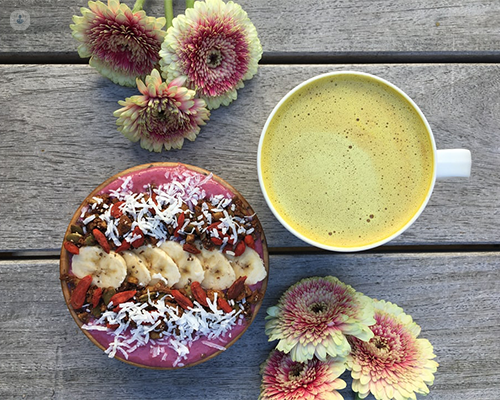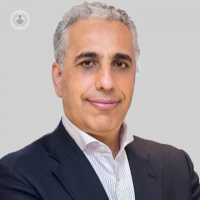Lowering breast cancer risk through nutrition
Written by:Breast cancer is the most common cancer among women, with a lifetime risk of one in every eight women suffering from this devastating disease. In addition to regular exercise, minimising exposure to air pollution, adopting a Mediterranean diet, and reducing the intake of red meat, animal fat and processed foods, there are a handful of specific nutrients which may reduce the risk of developing breast cancer.
In this article, internationally renowned breast cancer surgeon, Professor Kefah Mokbel, reviews and outlines the scientific evidence related to certain supplements and nutrients that can help lessen the chances of being diagnosed with this common condition that affects many women worldwide.

Folate (vitamin B9)
Vitamin B9 is an essential nutrient that naturally occurs as folate. In a pooled analysis of 23 prospective studies involving 41,516 cases of breast cancer; where up to 1,171,048 individuals were included for meta-analysis; folate intake was found to be associated with an 18 per cent decrease in risk of developing hormone receptor negative breast cancer. Moreover, an increment of folate intake of 100 micrograms per day was associated with a ten per cent decrease in risk among women who drink moderate amounts of alcohol.
Furthermore, it was found that BRCA1 mutation carriers who used any folic acid-containing supplement had a significantly decreased risk of breast cancer (55 per cent risk reduction) compared to women who never used a folic acid-containing supplement. Similarly, a relatively high dietary intake of folate was inversely associated with risk of cancer of the womb (48 per cent risk reduction) and ovaries (61 per cent risk reduction). Therefore, it can be concluded that it is highly recommended that women take a daily folate supplement (400 micrograms daily), as this is certainly a healthier form of vitamin B9 than that of folic acid.
Vitamin D3
It has been demonstrated that treating breast cancer cells with 1,25(OH)D3 induces two beneficial effects: an anti-proliferative effect suppressing growth of cells, and a pro-apoptotic effect, which assists in the natural death of breast cancer cells. A recent meta-analysis of 68 studies published in 2018 highlighted a protective effect between 25 (OH) vitamin D and breast cancer, with a 35 per cent reduction in risk observed in case-control studies, and a 15 per cent risk reduction in cohort studies.
A more recent study has demonstrated that vitamin D deficiency was directly related to breast cancer risk. On the other hand, total blood vitamin D levels. as well as a regular supplemental vitamin D intake, both had a protective effect.
Vitamin B6
Vitamin B6 is involved in many biochemical reactions and might play a role in carcinogenesis. A combined analysis data derived from five studies carried out in the United States; which included 2,509 breast cancer cases; showed that high serum pyridoxal 5′-phosphate (the active form of vitamin B6) levels were associated with a 20 per cent reduction in breast cancer among postmenopausal women.
Curcumin & Piperine
Curcumin influences breast development and progression through its effect on cell cycle and proliferation, natural cell death, cancer spread and development of new blood supply to support tumour progression. The key signalling pathways involved include the NFkB, PI3K/Akt/mTOR, MAPK and JAK/STAT. Curcumin also mediated modulation of tumour microenvironment, cancer immunity, breast cancer stem cells, as well as cancer related micro RNAs.
Despite the lack of evidence from human clinical studies, using curcumin as a therapeutic and preventive agent in breast cancer is supported by the extensive evidence derived from laboratory and animal studies demonstrating diverse biological activity against breast cancer cells and tumours.

Probiotics (Lactobacillus)
There is scientific evidence that heavily supports the fact that certain bacteria such as Lactococcus and Streptococcus exhibit anticancer properties, and, thus, can play a huge role in breast cancer prevention. Natural killer (NK) cells are vital in controlling tumour growth, with epidemiological studies showing that low NK cell activity is associated with an increased incidence of breast cancer.
Lactococcus lactis has been shown to activate murine splenic NK cells, enhancing cellular immunity against cancer. Furthermore, orally administered Lactobacillus species supplements have been shown to be protective in animal models of breast cancer. This may explain the protective effects of fermented soy beans and live yogurt against breast cancer.
Professor Kefah Mokbel is a highly esteemed breast cancer surgeon who specialises in the early detection of breast cancer and breast screening. Visit his Top Doctor's profile here to make an appointment with him.


